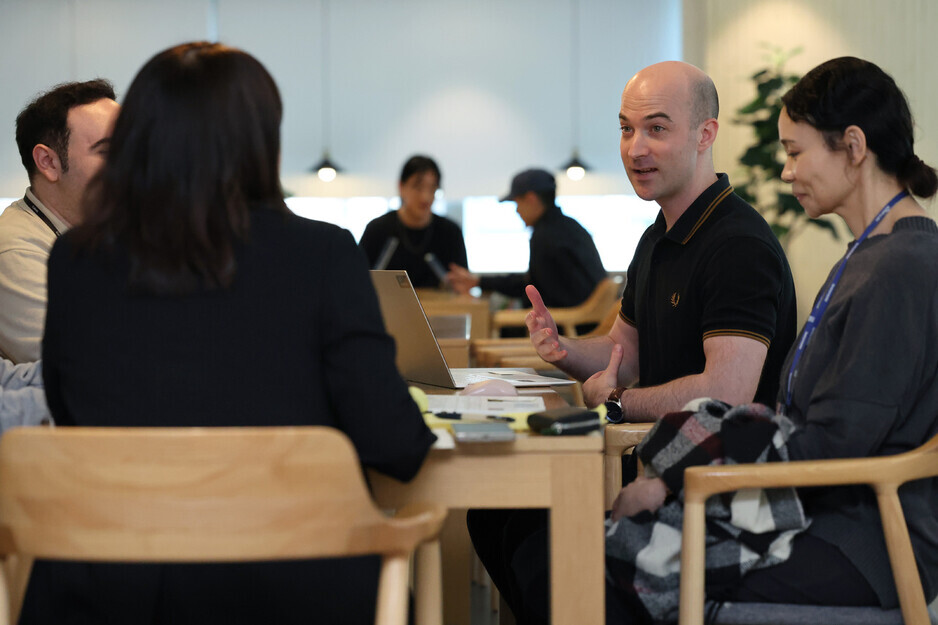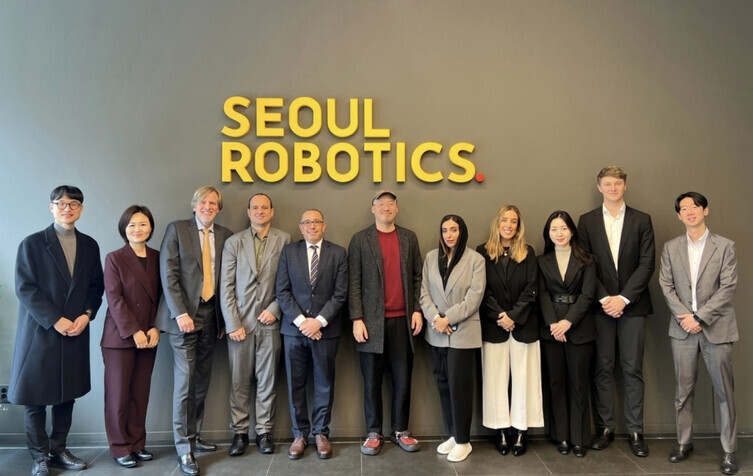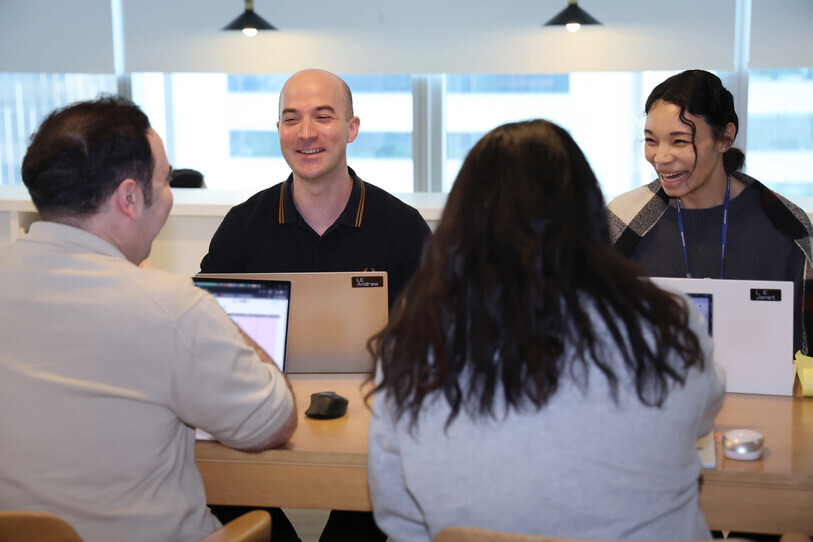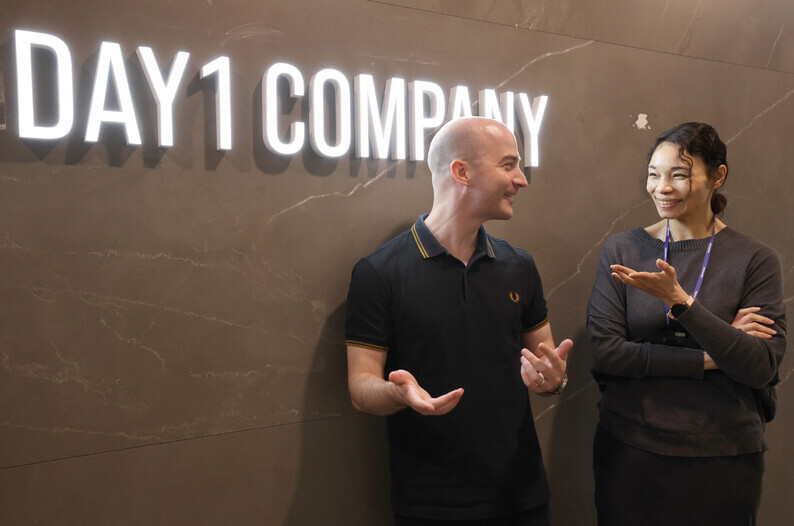hankyoreh
Links to other country sites 다른 나라 사이트 링크
The global professionals choosing to work and live in Korea

“Korea stands out because of its corporate culture, which is more open than other Asian countries such as Japan, as well as its robust IT infrastructure and its outstanding medical system. Korea is the first place considered by talented individuals from the US and Europe.” — Cindy Park, director of the people team at Seoul Robotics
Korean startups aiming at the global market are aggressively recruiting talent from overseas. Foreign staff and executives are a common sight at the startups clustered around Tehran Street in the Gangnam neighborhood of Seoul.
At Seoul Robotics, a software company focusing on autonomous driving for industrial purposes, 23 of 55 employees are from overseas. In particular, around 40% of the company’s 30-odd engineers are foreign graduates of such institutions as the Technical University of Munich in Germany, the Federal Institute of Technology Zurich in Switzerland, and the KTH Royal Institute of Technology in Sweden. Even the head of human resources is a German woman.
English-language meetings and customer support are a big boost for global expansion
The Hankyoreh visited the office of Seoul Robotics in Seocho District, on May 14. A meeting was being held in English in a glass conference room on the first floor.
“Our clients are global automakers such as BMW. One advantage for our clients is that even our engineers can provide immediate explanations in English, which streamlines customer support,” said Evan Thomas, a business development manager at the company, who spoke with our reporter after the meeting.
Of the company’s 3 billion won (US$2.2 million) in revenue last year, 80% came from overseas.

International employees are also the tip of the spear at Day 1 Company, an edutech firm looking to break into overseas markets. Day 1 Company made a name for itself in the domestic market with its online educational platform Fast Campus. Under its model of “light and fun learning,” the firm raked in 36 billion won (US$26.4 million) in revenue in 2022.
Day 1 also operates Lemonade, which recently waded into the Japanese market, and Coloso, an education platform for professionals that now operates in South Korea, the US, Japan and Taiwan, as companies in company (CIC).
Andrew Kempster, a graduate of the University of Gloucestershire in the UK, now heads Lemonade’s operations in Japan.
“I first heard about Korea during the 2002 World Cup. I came here in 2012 to teach English, but then I got another job offer. And now I’m in business development management,” he said.
International employees form the crux of Day 1 Company’s expansion into Taiwan and Indonesia. Dilesio Maria, an American who is the senior content marketing manager for Coloso’s international projects, graduated from Florida International University with a degree in business information systems.
“I wanted to try something new,” he said.
Something new turned into something permanent.
Tip of the spear, but still having visa troubles
In 2013, there were 41,000 international professionals working in specialized fields (based on E1-E7 visas) in South Korea. By 2023, this number had increased to 46,000. That’s an increase of 5,000 in 10 years. To get their visas, these professionals need certifications, a master’s degree or higher, and years of professional experience.
According to the Ministry of Justice and Statistics Korea, 74.8% of working professionals in specialized fields had a bachelor’s degree or higher. Nearly half of them were in their 30s (45.5%). Among foreign national workers who earn a monthly salary of 3 million won (US$2,200), 43% of them are in specialized fields, while 40.3% have permanent residency.
Many working at companies in Korea suggest that reducing the visa issuance conditions slightly might help in attracting specialized foreign workers.

Janet Russell, an American who works as a content developer for Lemonade, said that unlike professors or students, it is tremendously difficult for people in her position to receive an E-7 visa from the outset. She also said companies appeared to face a serious burden in having to invite people to start out in full-time positions without a training period.
Settling in for the long haul remains a difficult task. Miyuki Ikemoto, who heads the Japanese market planning team for Coloso, said she had to “work around the clock” to prepare for the switch to an F-2 visa while continuing her working duties.
“Once they complete a certain period, people with a professional employment visa are assigned points according to things like age, salary and education, with residence visas granted only to a few,” she explained.
“It’s more beneficial if you’ve completed your master’s degree in Korea, and since I had already graduated in Japan, I didn’t have enough points and I had to complete the 50-hour Korea Immigration and Integration Program,” she added.
“I continued working at the company, taking classes that went until Saturday evening and studying for the TOPIK,” she recalled, referring to the Test of Proficiency in Korean.
Those who want to remain in Korea for the long term prefer a residence visa to an E-7 “specific activity” visa, which is impacted by transfers and losses of employment.
Canadian Kyle Robinson is a developer for VoyagerX, a startup renowned for its AI video editing software Vrew.
“When I moved here long-term in 2020 it was on a working holiday visa. I then switched to an E-7 when I obtained an offer to work in 2021,” he said. But he noted that he had friends who had left Korea until they received a new visa because of all the difficulties getting signatures on exemption paperwork when they tried to transfer to another job.
Robinson, who earned a master’s in computer engineering at the University of Waterloo in Canada, had a relatively easy time getting an E-7 visa, but he is still preparing to switch to a residence visa that would allow “greater freedom.”
“I had a lot of talented friends who came to Korea with big dreams, only to not find a job and end up going back home,” shared Geoffrey Yau, who majored in Korean studies and said he'd come from the UK to Korea on the Korean Government Scholarship Program (KGSP). “Landing my first job was the happiest I’d been since I got here.”
Many of the people the Hankyoreh spoke to said that they had ended up settling in the country after coming to Korea as exchange students or through the KGSP program. Robinson shared that he had come to Korea “almost by accident”: While he had initially hoped to spend his study abroad in Singapore, there were so many applicants that his school changed his destination to Korea.
Pros: Culture of efficiency, convenience. Cons: Lack of English support for tax, hospital services
At the same time, there have inevitably been downsides to choosing Korea as a destination for living long-term.
“It’s easy to settle down if you marry a Korean, but not if you’re single. [Laugh.] They gave disaster relief to tax-paying foreigners during the pandemic, but they said that I didn’t qualify because I live alone,” said Ikemoto.
Russell mentioned a lack of English-friendly options at hospitals and when trying to figure out taxes. “They say we have to do taxes online, but there's no way to see it in English. So how are we expected to do that?”
Even small things can become hassles for foreign nationals living in Korea. “Sometimes websites don’t work for foreign names, because the text box will be made for Korean names that are three, maybe four characters long,” said Kempster.

“From my experience, obtaining a loan for [monthly rental housing] is factually impossible,” said Robinson. “Jeonse loans for foreign seem to be available now, but only up to 200 million won. I have student loan payments in the tens of millions of won I am still paying, and I expect that many moving from North America might be in the same situation. This can make finding housing virtually impossible without outside support.”
“I could see this being a reason for many to leave, or not come in the first place,” he added.
The work culture in Korea can also leave something to be desired.
“I think you kind of work 24/7,” said Kempster. “In the UK, when I finish work, I’m not checking my emails, I’m not checking Slack. In Korea, you always need to look at messages in case something happens.”
At the same time, he said that “sometimes it's easier to spend two minutes answering questions” so that it doesn’t take an hour the next day, remarking that “everything's very organized and I think that suits my personality.”
Kempster also praised Korea for its convenience, particularly in terms of public transportation.
“In England, if you don’t have a car you can’t live. Here, going anywhere is just a ride on the bus, a ride on the subway.”
Please direct questions or comments to [english@hani.co.kr]

Editorial・opinion
![[Column] Kim and Putin’s new world order [Column] Kim and Putin’s new world order](https://flexible.img.hani.co.kr/flexible/normal/500/300/imgdb/original/2024/0625/9617193034806503.jpg) [Column] Kim and Putin’s new world order
[Column] Kim and Putin’s new world order![[Editorial] Workplace hazards can be prevented — why weren’t they this time? [Editorial] Workplace hazards can be prevented — why weren’t they this time?](https://flexible.img.hani.co.kr/flexible/normal/500/300/imgdb/original/2024/0625/7817193028141614.jpg) [Editorial] Workplace hazards can be prevented — why weren’t they this time?
[Editorial] Workplace hazards can be prevented — why weren’t they this time?- [Editorial] Seoul failed to use diplomacy with Moscow — now it’s resorting to threats
- [Column] Balloons, drones, wiretapping… Yongsan’s got it all!
- [Editorial] It’s time for us all to rethink our approach to North Korea
- [Column] Why empty gestures matter more than ever
- [Editorial] Seoul’s part in N. Korea, Russia upgrading ties to a ‘strategic partnership’
- [Column] The tragedy of Korea’s perpetually self-sabotaging diplomacy with Japan
- [Column] Moon Jae-in’s defense doublethink
- [Column] S. Korea-China cooperation still has a long way to go
Most viewed articles
- 1Blaze at lithium battery plant in Korea leaves over 20 dead
- 2Foreign day laborers make up majority of death toll in Korean battery factory fire
- 3[Column] Kim and Putin’s new world order
- 4[Editorial] Workplace hazards can be prevented — why weren’t they this time?
- 5[Editorial] Seoul failed to use diplomacy with Moscow — now it’s resorting to threats
- 6After Putin’s Pyongyang summit, Seoul and Moscow play dangerous game
- 7What made Korea’s lithium battery plant fire so deadly
- 8How sanctions are backfiring to fuel a new Eurasian alliance
- 9Enough trash-slinging — it’s time to pursue ‘strategic communication’
- 10Russia’s actions will dictate what weapons Seoul may supply to Ukraine, security adviser says